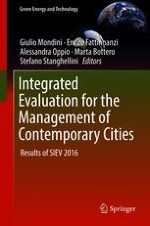2018 | OriginalPaper | Buchkapitel
When Efficiency Is Not Enough: Should Equity be Embedded in Decision Making and Evaluation?
verfasst von : Marta Berni, Laura Gabrielli
Erschienen in: Integrated Evaluation for the Management of Contemporary Cities
Aktivieren Sie unsere intelligente Suche, um passende Fachinhalte oder Patente zu finden.
Wählen Sie Textabschnitte aus um mit Künstlicher Intelligenz passenden Patente zu finden. powered by
Markieren Sie Textabschnitte, um KI-gestützt weitere passende Inhalte zu finden. powered by
